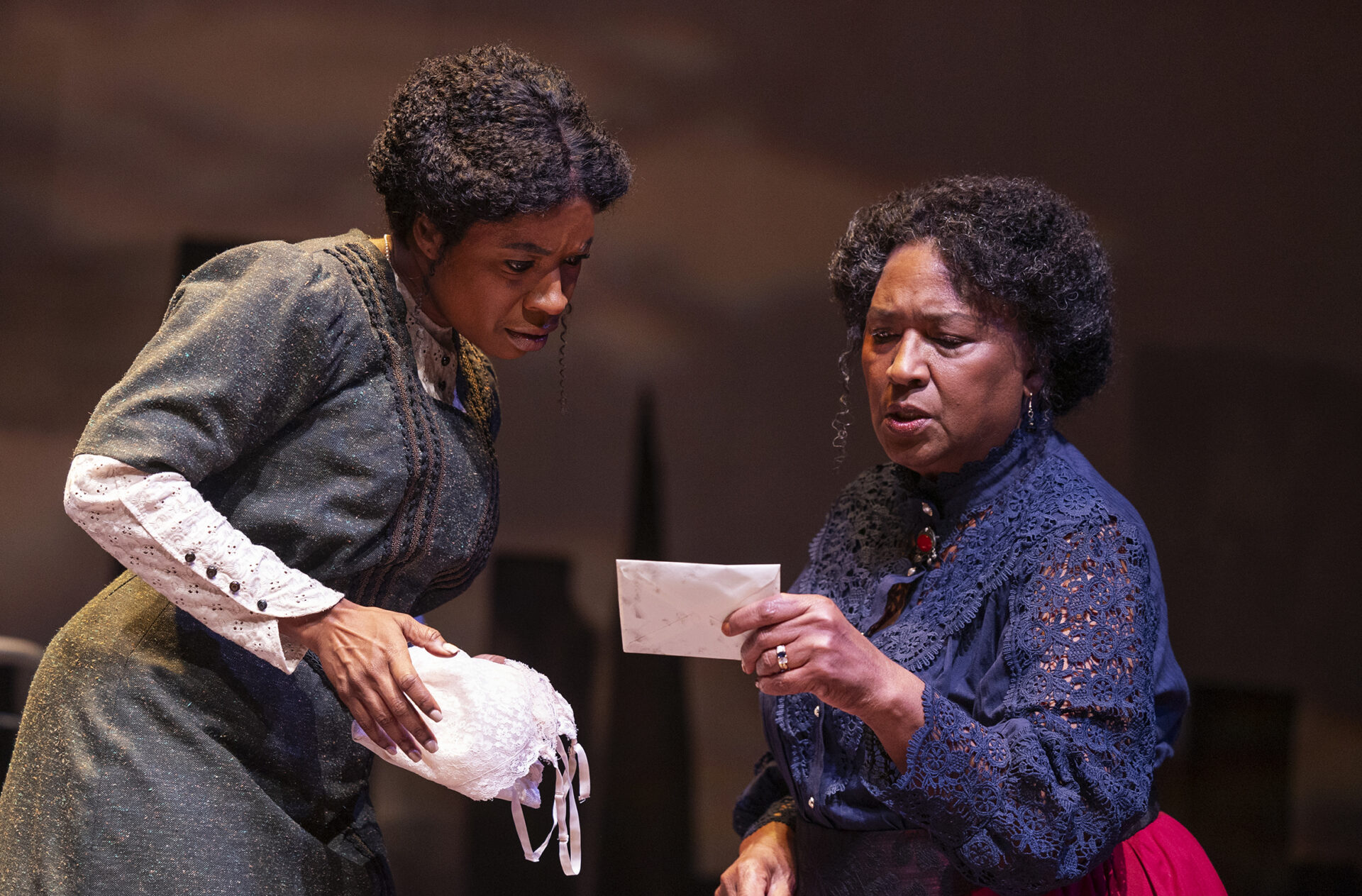
Review: Intimate Apparel, Arizona Theatre Company
By Gil Benbrook. Originally published in Talkin’ Broadway.
Lynn Nottage’s Intimate Apparel is a poignant drama that explores love, longing, and the pursuit of dreams in early 20th-century New York City. Arizona Theatre Company is currently presenting an exquisite production of this deeply resonating drama with an impeccable cast, emotionally rich direction, and gorgeous creative elements.
Set in 1905, the play follows Esther Mills, a talented African American seamstress who makes a living by creating exquisite lingerie after discovering that she will be well paid by a range of clientele–including wealthy socialites and prostitutes–when practicing discretion. However, despite her skill, strength, and independence, the 35-year-old Esther harbors a profound sense of loneliness and questions if her average looks will limit her ability in ever finding a husband, love, and companionship. When she begins a romantic correspondence with George Armstrong, a Caribbean laborer working on the Panama Canal, Esther’s hopes for a brighter future are ignited. However, as their relationship unfolds through the letters they exchange, and George makes plans to come to America, she discovers that love is not always as it seems.
Nottage, the only female playwright to have been awarded the Pulitzer Prize for Drama twice (for her plays Ruined and Sweat), based the character of Esther on her great grandmother, who was also a talented seamstress in the early 1900s. Her plays feature characters and situations that resonate and that cross class and racial boundaries while also shining a light on the experiences of marginalized voices often overlooked by history. Intimate Apparel is a timeless story that focuses on love, loss, and the search for connection in a world continually fraught with barriers and obstacles. Through Esther’s journey, Nottage also explores themes of race, class, and gender with sensitivity and insight.
Tracey N. Bonner is superb in the role of Esther, a woman of quiet strength and resilience. Bonner brings a sense of grace, depth, and a firm understanding of this fascinating woman who has to navigate her own way through the complexities of being a Black woman in turn-of-the-century America. As Esther creates the gorgeous and elaborate garments and comes to understand the dreams and desires of her clients, she is also grappling with her own longing for love and belonging, and wonders if her own dreams will ever come true. Bonner’s portrayal is infused with nuance and sensitivity and an unbridled clarity that makes you not only connect immediately with her but want to make sure no harm comes to Esther and that her dreams do come true. It’s an exquisite performance of an engaging character full of both heartbreak and hope.
Corey Jones is suave, charismatic, and somewhat mysterious as George Armstrong. Jones manages to capture the allure, depth, and complexity of this man who forces Esther to confront the harsh realities of love. In the supporting cast, Dawn Cantwell is luminous and elegant as Mrs. Van Buren, a wealthy socialite longing for connection, and Saundra McClain is warm and humorous as Mrs. Dickson, Esther’s opinionated, busybody landlady who also offers sage advice whether anyone ask for it or not. As Mayme, a prostitute who has dreams of a better life, Sarah Hollis is spirited, but we can also see the vulnerability underneath her powerful exterior. Aaron Cammack is excellent as Mr. Marks, the reserved Jewish fabric salesman who strikes up a friendship with Esther. Cammack brings a sense of dignity, humor, and grace to the character and his scenes with Bonner are tender and infused with longing and emotion. Along with Bonner and Jones, Cantwell, McClain, Hollis, and Cammack create compelling characters who are all faced with their own struggles, fears and desires.
Under the skillful direction of Oz Scott, the performances are rich, authentic, and instilled with emotion and depth. Scott’s staging makes fantastic use of Alexander Dodge’s gorgeous set design, which features separate areas for the various locations in the play. Bonner is on stage for almost the entire play and her refined performance and Scott’s emotionally rich direction draw the audience into the intimate world of Esther’s boardinghouse room and the high-class and low-class environs of early 20th-century New York City.
In addition to Dodge’s evocative setting, which also features a beautiful sepia-hued backdrop of the Manhattan skyline filled with skyscrapers that surrounds the stage, Karen Perry’s richly detailed costumes capture the elegance and glamour of the era. Victor En Yu Tan’s lighting design echoes the range of emotions in the piece, and the sound design by Daniel Perelstein Jaquette features a range of sounds and music that complement the drama.
Esther’s journey is deeply personal but also universal in how it invites audiences to reflect on their own relationships and dreams while reminding us of how love can transcend boundaries. Intimate Apparel is ultimately a play about hope, and Arizona Theatre Company’s superb production is a testament to the power of hope and perseverance in the face of adversity and the need to hold onto your dreams no matter the cost.